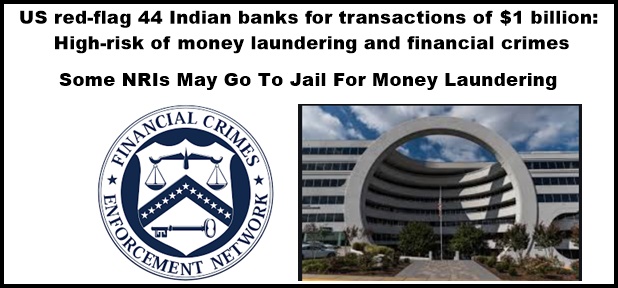 |
US red-flag 44 Indian banks for transactions of $1 billion: High-risk of money laundering and financial crimes

Los Angeles, September 24, 2020
NRIpress.club/Ramesh/Agary Singh
A Suspicious Activity Report (SAR) is a document that financial institutions, and those associated with their business, must file with the Financial Crimes Enforcement Network (FinCEN) whenever there is a suspected case of money laundering or fraud. SARS was designed to be the centerpiece of a new approach to using the Bank Secrecy Act (BSA) to fight financial crime, and serious activity among.
The SARs provide a rare peek into how businessmen, politicians and their companies utilise banking channels around the world to move their wealth across borders or to tax havens to avoid taxation or detection.
The Financial Crimes Enforcement Network (FinCEN) Files contain a 20-page “intelligence assessment” on the mirror network:
· 44 Indian banks have been flagged in connection with transactions by Indian entities and individuals in a set of Suspicious Activity Reports filed by US banks with the watchdog agency.
1. Punjab National Bank-290 transactions
2. Canara Bank- 190
3. State Bank of India- Over 100
4. Union Bank of India-99
5. Bank of Baroda-93
6. HDFC Bank-253 transaction)
7. ICICI Bank-57
8. Kotak Mahindra Bank-268
9. IndusInd Bank-117 …..others
Foreign banks:
1. Deutsche Bank Trust Company Americas (DBTCA)
2. BNY Mellon
3. Citibank
4. Standard Chartered and JP Morgan Chase among others.
Crack down on secrecy of offshore transactions/ Cross-border payment:
· Indian banks are primarily because they are “correspondent banks” to the foreign banks. Suspicious transactions carried out through the international payment gateway of foreign banks such as mentioned above.
· Indian Banks such as State Bank of India offices in North America and Union Bank of India in UK are answerable to SAR about all transactions.
The files allude to at least $2 trillion being flagged as possible evidence of money laundering or other criminal activity between 1997-2017. Swiss Leaks in 2015, the Panama Papers in 2016, and the Paradise Papers in 2017, all of which have served to pierce the veil of secrecy shrouding cross-border capital flows by Indian firms and citizens.
In 2017, two years after the last of these SARs were sent to FinCEN, the RBI initiated bankruptcy proceedings against Bhushan Steel for alleged loan defaults worth Rs 56,000 crore, triggering probes by the Serious Fraud Investigation Office (SFIO) and Enforcement Directorate (ED).
India’s third largest secondary steel producer and flagship of Bhushan Group promoted by Neeraj Singal and his father Brij Bhushan Singal, was acquired by Tata Steel for Rs 35,232 crore through the insolvency process.
Layer by layer, the secrecy that shrouds international money flows involving Indians has been unpeeled — beginning with the Offshore Leaks in 2013, Swiss Leaks in 2015, Panama Papers in 2016, and Paradise Papers in 2017, in a series of investigations by The Indian Express. Now comes the FinCEN Files.
These documents, called Suspicious Activity Reports or SARs, which constitute the FinCEN Files, are not evidence of illegality. They reflect views by watchdogs within banks.
When Media started to send letters to Banks or inquiry on telephone regarding SAR’s concern, there answer was simple to media: “The information you are looking, not available because of SAR’ confidentiality regulations.”

|